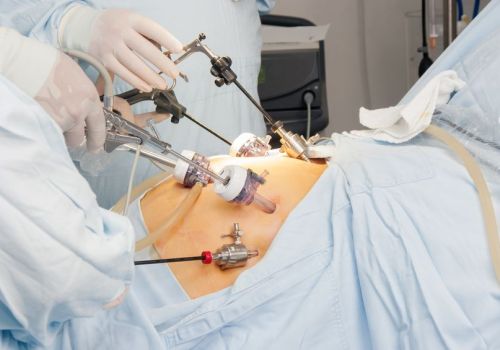 Many ways exist to determine candidates eligible for bariatric surgery. However, most patients find it difficult to choose the right procedure given the wide variety of weight-loss surgery options. Gastric bypass and gastric sleeve surgery are two common types of weight loss procedures for an average patient suffering from severe obesity. While both procedures are good options for promoting weight loss, a few considerations might increase the scales in favor of one over another. This article looks at the difference between gastric bypass and sleeve gastrectomy to help you decide what type of weight-loss surgery is right for you.
Many ways exist to determine candidates eligible for bariatric surgery. However, most patients find it difficult to choose the right procedure given the wide variety of weight-loss surgery options. Gastric bypass and gastric sleeve surgery are two common types of weight loss procedures for an average patient suffering from severe obesity. While both procedures are good options for promoting weight loss, a few considerations might increase the scales in favor of one over another. This article looks at the difference between gastric bypass and sleeve gastrectomy to help you decide what type of weight-loss surgery is right for you.
What is Gastric Bypass Surgery?
Roux-en-Y gastric bypass surgery is a laparoscopic procedure that shortens the digestive tract and restricts food intake by creating a small pouch from the upper part of the stomach. A small opening is created by connecting the small intestine to the newly created stomach pouch for food to pass through. The remaining part of the intestines and the larger portion of the stomach are bypassed to limit the amount of food intake as well as the nutrients and calories absorbed from food. This means that the food consumed by a patient passes directly to the small intestine because a larger percentage of the gastrointestinal tract has been rerouted.
What is Gastric Sleeve Surgery?
A sleeve gastrectomy or gastric sleeve surgery involves the creation of a sleeve-shaped tube from a small portion of the stomach. Since the majority of the stomach is removed, the amount of food consumed will pass directly through the sleeve-shaped tube into the intestines. Unlike gastric bypass surgery, calories and nutrients from food will be absorbed normally but the patient will feel full sooner and longer. Gastric sleeve surgery is a great alternative for patients who want to restrict the amount of food they consume without altering the route of the gastrointestinal tract.
Factors to Consider When Choosing Between Gastric Bypass and Gastric Sleeve Surgery
- Good Candidates for Each Procedure
Gastric bypass is good for patients with severe reflux disease, high body mass index, and different types of diabetes. It is ideal for patients with a BMI of 40 and above and those who find it extremely difficult to lose weight with diet, exercise, and medication. Gastric sleeve surgery is recommended for patients who have had multiple abdominal surgeries. It has a shorter anesthesia time and you are more likely to recover faster than patients who have undergone gastric bypass. Sleeve gastrectomy is less affected by the scar tissues as it focusses primarily on the upper part of the stomach.
- Weight Loss Results
Gastric bypass leads to slow but steady weight loss and patients are likely to lose 60 percent or more of their excess weight after surgery. However, many patients experience side effects such as back pain, sleep apnea, and high blood pressure after undergoing gastric bypass surgery. Low BMI patients may experience a faster weight loss rate after undergoing gastric sleeve surgery. Patients can maintain a loss of 50 to 70 percent of their excess body weight in the next five years with the right exercise and nutrition. However, you can gain the weight back if you do not implement healthy lifestyle changes after the surgery.
- Procedural Times
Going under anesthesia poses a higher risk for obese patients with co-morbidities like high blood pressure and cholesterol levels. Gastric bypass takes a longer anesthesia time compared to sleeve gastrectomy because of the complexity of the procedure. Although procedural times should be a minor factor in your final decision, it is important to consider your health condition before the surgery and the possibility of switching to an alternative.
Which Surgery is Good for Me?
The type of surgery that is best for you will depend on several factors such as qualifications for the procedure, health condition before surgery, and your final decision, given alternatives. In terms of safety, sleeve gastrectomy is safer than gastric bypass because of the lower anesthesia time, quick recovery, and healthy weight loss results. A gastric bypass is an ideal option for patients with high BMI or severe reflux disease as it makes them lose more weight compared to sleeve gastrectomy.
Both gastric bypass and gastric sleeve surgery can help you lose weight but the decision between the two is often influenced by the complexity of the procedure. Although sleeve gastrectomy offers more benefits in terms of safety, it does not mean that gastric bypass is not effective. Both of them are ideal for suitable candidates and can facilitate weight loss if you implement the lifestyle changes and recommendations given after surgery. However, it is important to discuss the benefits and downsides of each procedure with your surgeon to find one that works best for you.
Our team at the Weight Loss and Wellness Center can help you find the best weight loss solution for you and your body so you can get back to your healthiest self. Contact us today for a consultation, or call us at (973) 888-1085.

